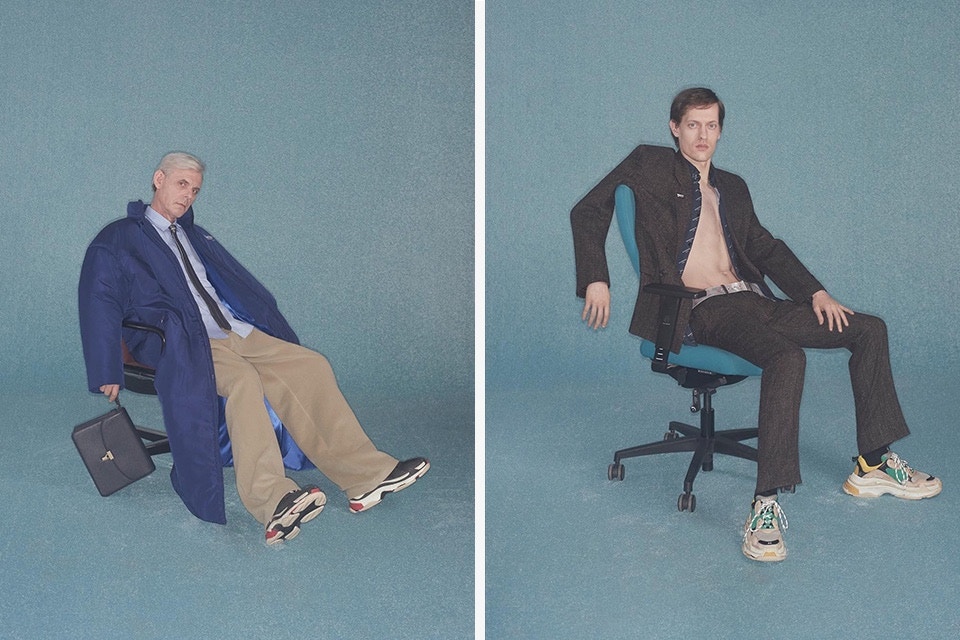
image: Balenciaga
Men and millennials are driving significant growth for Balenciaga, according to the brand’s CEO, with the 100-year old couture house posting the fastest growth rates of all the fashion brands under the Kering umbrella, outpacing Gucci, Saint Laurent, Alexander McQueen, and co. “Millennials represent 60 percent of what we sell. Together with men, these are growing faster than any other category,” Balenciaga CEO Cedric Charbit said during the Financial Times’ luxury goods conference in Venice, Italy on Tuesday.
While Balenciaga claims a far smaller percentage of Kering’s annual sales than the Paris-based luxury conglomerate’s marquee brand, Gucci, Charbit said Balenciaga has been its fastest-growing brand over the past two quarters, “trumping [Gucci’s] 49 percent rise in comparable sales in the January to March period,” per Reuters. The publication further quoted Charbit as saying that Balenciaga is growing by “more than 100 percent in some cases, across all areas, from handbags to clothing, even though the brand has become known for its $850 thick-soled ‘Triple S’ sneakers.”
Reuters further notes that “men’s fashion has typically contributed less to luxury brand earnings than women’s clothing and accessories, but an emphasis on high-end casualwear at many labels as well as a push to sell online has begun to fuel growth in this segment.”
Meanwhile, as Charbit was outlining Balenciaga’s impressive stats in Venice, designer Ralph Rucci opted to speak out against Balenciaga creative director Demna Gvasalia’s work at the Paris-based brand. Georgia-born Gvasalia took the helm in 2015 and has since helped turn Balenciaga into a brand best known not for its couture roots but instead, for its takes on irony, massive silhouettes and edgy styling. Read between the lines and Mr. Rucci also appears to target the François-Henri Pinault-chaired Kering for its continued employment of the very-buzzy fashion designer.
On Instagram on Tuesday, Rucci did not mince words, writing, “I have been told to be quiet, and I have turned my eyes away, but I cannot tolerate this any longer. This is the ultimate in EVERYTHING [Cristóbal Balenciaga] did not strive for. They have taken his name and have conveniently used as a springboard for such mediocrity, such tastelessness, such ugly ideas. Without balance, respect for proportion, without quality, without integrity – just the whorish greed to sell a gym shoe, a t-shirt, a back pack.”
He continued on, “Enough. Remove his name from all of this garbage. Rename it with something that mirrors what it is. This is not even the emperor’s new clothes. This is the moment for a smoke screen of season after season of the worst design ethic ever. How dare you people use [Mr. Balenciaga’s] name. You may own it, but you will never honor him AND have a meaningful business until you cease! If you would like to have a brand that has the DNA in its vein as well as a direction and a couture, feel free to get in touch with me.”
Mr. Rucci is hardly the first outspoken critic of Gvasalia. In a recent Op-Ed entitled, “Is Balenciaga Socially Irresponsible?,” Style Zeitgeist’s Eugene Rabkin slammed Gvasalia’s work, stating, “There is something more unsavory about Balenciaga. Namely, it is that I find the output of Demna Gvasalia distasteful in the way it hijacks the aesthetic codes of the poor and dishes them out to those who can afford $800 hoodies.”
“Much of Gvasalia’s output at Balenciaga,” Rabkin poingnantly writes, “offers mundane [clothing and accessories], appropriated from the poor, for the enjoyment of the rich. And there is something self-evidently perverse in consuming the mundane at high prices.”
“In truth, Balenciaga does nothing for the poor, except the lip service of a donation of $250k to the World Food Programme (Kering’s, Balenciaga’s parent company, revenue for 2017 was $18 billion). The pretense on Gvasalia’s part at celebrating the poor is largely just that, a pretense … Not only the poor don’t know or can’t afford Balenciaga – they are not even looking at the magazines that Balenciaga advertises in. Simply put, Balenciaga is not in their orbit.”
Gvasalia’s side-gig, his (increasingly less) hip Vetements brand, has not gone unscathed either. In March, Highsnobiety rocked the fashion internet when it declared Vetements dead. After identifying slash-price wares from the Paris-turned-Swiss-based brand across the web and talking to a number of buyers, many of whom testified to the wild drop in demand for Gvasalia’s label, Vetements was deemed “completely dead” from a retail standpoint.
The bold claim came less than three years after the menswear site’s Alec Leach says “the world stood up and really took notice” (the date at hand coincides with the brand’s Spring/Summer 2016 show complete with those DHL tees).
Yet, despite blow after blow being lodged towards Demna Gvasalia, his offerings, and his points of reference, it is difficult to ignore that consumers seem to keep buying what he is selling … even if it is at sale prices.







